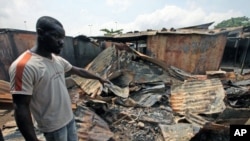The medical aid group Doctors Without Borders says “intense armed conflict and political gridlock” are taking a toll on Ivory Coast’s civilian population. The group, also known as MSF, is trying to fill the gaps left by a barely functioning health care system.
Renzo Fricke, MSF emergency coordinator, says, “Our teams are really trying to be where things are moving, things are going on. For the time being, we are operational in two main areas, which are in Abidjan and in the western part of the country.”
Injuries and disease
“In Abidjan, mostly what we see are civilians wounded due to violence or because of demonstrations or because of fighting,” he says. “These are the wounded we see arriving in bad condition in general. In other structures where we run primary healthcare… it’s basically to replace the health system that is completely non-existent for the time being. And in these places what we see, I would say, are regular diseases like diarrhea, children having malaria, respiratory infections and things like that.”
It’s estimated between 300,000 and 400,000 people have been displaced by the Ivoirian political crisis and violence. Many have sought shelter in the bush, far from standard medical clinics.
Much of the fighting in Abidjan has centered in the Abobo district, where reports say there is only one hospital that’s still functioning. Doctors Without Borders has staff there.
Fricke says, “We are working and trying to open more structures in Abidjan because we really think we can have an added value in this environment. In this hospital in Abobo, we have seen so far around 10 or 15 people per day wounded…. In two weeks, these two last weeks, we had 130 wounded arriving…that we could treat.”
He points out that the medical aid group is neutral in the crisis, allowing it to operate among opposing sides. “We are respected by the population for that,” he said.
It’s believed there are many people in Abidjan who need medical care but who are unable to get to a clinic or hospital.
“Access is very difficult. And of course it’s very difficult to get reliable data on people who don’t access a health structure. But in any conflict setting and so on, we always know that only a part of the wounded or people in need of care actually reach a medical facility,” he says.
Going mobile
MSF is now running mobile clinics to bring medical care to where it’s needed, rather than waiting for patients to arrive at hospitals.
“We are running these mobile clinics in western Ivory Coast, also in Liberia, where there are tens of thousands of refugees, Ivoirian refugees,” says Fricke. "In Abidjan, we are more focused on directly supporting hospitals.”
MSF says, “The commercial and financial sanctions imposed by the international community against Ivory Coast, coupled with transportation problems, have led to shortages in medicines and medical supplies.”
The group says it has enough medicines for its operations, but the government is in short supply. MSF emphasizes that while it’s a large organization, it cannot replace the formal state health system in Ivory Coast.











